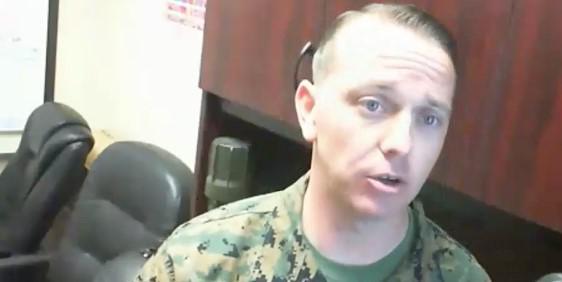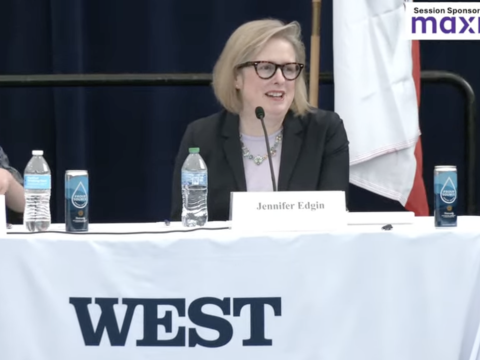U.S. Navy and Marines Pursue Innovative Training Models
The U.S. Navy and Marines Corps are harnessing virtual platforms and advanced methods to teach cyber and communications skills. In some cases, the services are looking to a “blended model” of instruction from both industry and military cyber experts that produces multitudes of trained personnel for a single investment. Additionally, to create a powerful cyber force, technical training needs to be as realistic as possible, with high-fidelity cyber training ranges that can meet high standards for mission rehearsals and training on a daily basis and can be accessed anywhere in the world.
For companies developing associated training, the services are asking industry to create a learning experience more aligned with the goals of delivering almost entirely virtualized cloud-based cyber training solutions. Gone are the days of multiweek vendor-provided service training and certification models, advised Chief Warrant Officer 2 Clayton Henry, USN. The Navy is looking to create and own all of its training data and content, shifting away from a certification pipeline to a continuous training-based model.
In addition, for instructors, the Navy should tap into their cyber professionals, who are lifelong learners of their cyber trade, that can teach at a higher level.
“Certification schools and boot camps offer a great deal of knowledge and insight into cyber areas, but they are expensive on a large scale, nonrepeatable and offer little to no follow-on practical practice,” advised Chief Henry. The chief, who is stationed in the Innovation Capabilities Department at the U.S. Fleet Cyber Command, 10th Fleet, is the primary point of contact for virtualized cyber training, training platform programmatics and training platform access.
“If the Navy works with vendors to create cyber training solutions that can be taught by both service members and institutional professionals, our cost will go down and our range time will go up,” he said.
Cyber certification schools & boot camps offer a great deal of knowledge, but they are expensive on a large scale, non-repeatable & offer little to no-follow on practice says @USNavy CWO2 Clayton Henry, Innovation Capabilities Dept., Fleet Cyber Cmd, 10th Fleet #AFCEATechNet pic.twitter.com/VzLNayM1Lq
— Kimberly Underwood (@Kunderwood_SGNL) May 18, 2021
Chief Henry acknowledges that naval cyber instructors would have to balance time away from their billeted commitments to teach in an adjunct model, and the Navy would have to set up universal milestones for judging or assessing cyber-specific professional skill sets of those instructors. “So, for the initial rendition of this model, a volunteer and certified training approach should be the starting point,” he explained.
“To have the capability to build repeatable, on-demand training content is the future of cyber training,” the chief emphasized. “The key to building and maintaining this style of training is access and repetition. And we're going to take these training ranges and this training approach to the greater joint community. Adapting to this new generation of training model is imperative for industry and the DOD.”
Meanwhile, the Marine Corps Communication-Electronics School is moving to shake off a bit of its “very slow” standard education processes that do not support the service’s Force Design 2030 effort and the goal of becoming more integrated with the Navy. Even in some best-case scenarios, the current standard curriculum update plan for the Marine Corps is every three years, which creates a risky gap in knowledge and stifles technological adoption, stated Chief Warrant Officer 4 Daniel Belew, USMC, academics officer, Marine Corps Communication-Electronics School.
Instead, the Marine Corps chief is working to incorporate an “always-on feedback loop” in which incremental change is incorporated in the academic cycle. The new method is akin to agile management processes or in software development, the concept of development security operations, known as DevSecOps.
“Our units are able to right now provide me with a constant update on the curriculum and how it is that we are developing it,” Chief Belew said. “I’ll have a faster update cycle, basically somewhere around three months, where I can integrate their information into our curriculum. If it is something that requires a change in the curriculum that needs to be approved by others, then we can start that process at a much faster pace. With these kinds of concepts, we can make our systems update and our training update at a faster cycle to keep pace with not just what commercial industries are able to produce for us but also with the potential threats that we could face.”
Training @USMC right from beginning with younger Marines is emphasizing how Marine Corps Systems will integrate with the @USNavy, says Chief Belew (middle top) #ForceIntegration #AFCEATechNet pic.twitter.com/ewPBAOl6g0
— Kimberly Underwood (@Kunderwood_SGNL) May 18, 2021
The service also is tailoring its instructional methods to focus on students’ learning styles and is conducting testing up front to gauge students’ current capabilities. That information is then used “to drive what it is that we need to teach them,” Chief Belew said. By identifying weaknesses and improving students’ understanding it quickly brings their knowledge of a communications system up to higher standard.
In addition, the Marine Corps is pursuing game-based training, augmented and virtual reality-based learning and a digital classroom that is interactive, all of which are effective especially with entry-level Marines who are more familiar with digital learning.
“We're still also doing a lot of standing on a stage telling you what you need to know, and you take notes, pass the test and move on, but these new concepts, they're really focused more on the student being the driver for their own education,” Chief Belew stressed. “We think that that's probably the best way to teach.”
Chief Belew acknowledges that instructors, too, have to shift how they teach warfighters. “It is also a normal part of military culture where it's probably going to be a higher-ranked individual who's up there teaching and normal military protocols would say you show deference to that individual, except what they are telling you is the way things are instead of questioning and driving your education and your learning,” he said.
The chiefs spoke on May 18 at AFCEA's TechNet Augusta Virtual Solutions Series.



Comments